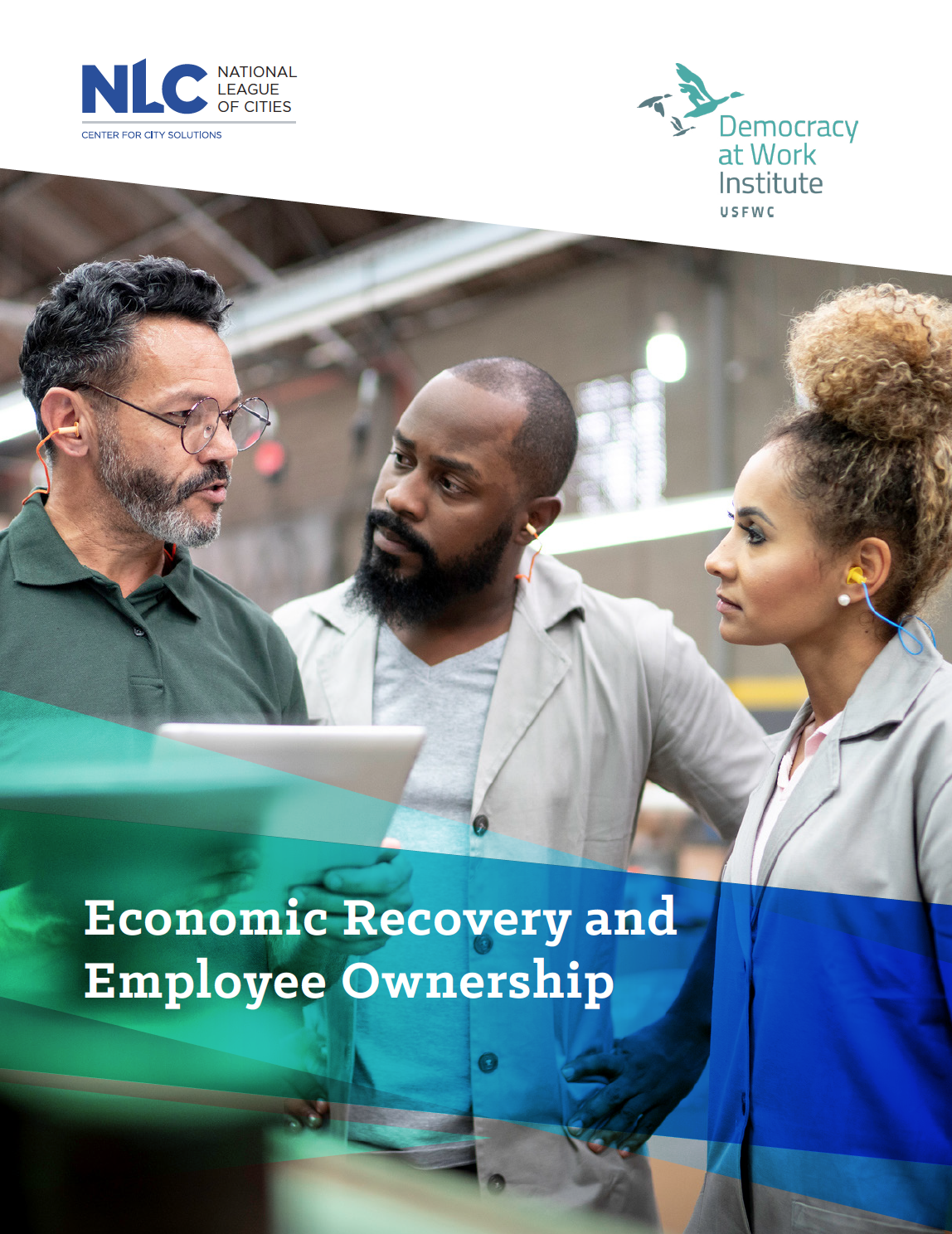Oakland, Calif, May 20, 2021 — The National League of Cities (NLC) and the Democracy at Work Institute (DAWI) released today new guidance for U.S. cities to pursue equitable post-COVID economic recovery through the use of employee ownership.
The new report, titled “Economic Recovery and Employee Ownership,” walks city leadership through the use of employee ownership—businesses owned completely or partially by their employees—as an essential tool in efforts to support small businesses, their employees, and local communities at a time of great need.
 Small businesses, which employ nearly half of the U.S. private workforce, have been impacted by COVID-19 in ways capable of devastating local economies. Business closures, job losses, and the shift away from local ownership collectively contribute to a loss of community vitality and character while accelerating economic inequality. Through employee ownership, the report states, cities can address the economic effects of COVID-19 by saving jobs, retaining valued businesses, and reducing widening wealth gaps.
Small businesses, which employ nearly half of the U.S. private workforce, have been impacted by COVID-19 in ways capable of devastating local economies. Business closures, job losses, and the shift away from local ownership collectively contribute to a loss of community vitality and character while accelerating economic inequality. Through employee ownership, the report states, cities can address the economic effects of COVID-19 by saving jobs, retaining valued businesses, and reducing widening wealth gaps.
“Small businesses are an important part of what makes cities livable. They also provide an economic toehold for local entrepreneurs. As cities seek solutions to the pressing needs of workers and businesses in their communities, they are increasingly turning to employee ownership to ensure that economic recovery efforts are inclusive,” said Melissa Hoover, Executive Director at DAWI. “Now is the time to invest in equitable solutions that can scale, like employee ownership.”
To help city leadership learn about employee ownership and its benefits, the report outlines:
- Models of city support for employee ownership in U.S. cities
- Types and benefits of employee ownership
- The role local governments can play in creating conditions that support employee-owned businesses
- Strategies to enable more businesses to become employee-owned
“The last year has been especially difficult for small and minority-owned businesses. The release of “Economic Recovery and Employee Ownership” could not have come at a more opportune time, offering tools for local governments to save small businesses,” said Clarence Anthony, CEO and Executive Director of National League of Cities. “Cities, towns and villages have a once in a generation opportunity because of the American Rescue Plan Act to rethink and enhance, through a racial equity lens, support and resources to small businesses. Employee ownership models have the potential to expand the middle class and narrow the racial wealth gap that is glaring in our communities.”
Research has shown employee ownership to have clear positive impacts for workers and local communities. The benefits of employee ownership include:
- Higher wages: On average employee-owners making less than $30,000 have 17% greater median household net worth and 22% higher median income from wages than their non-owner peers.
- Building assets: In a 2018 survey of employee-owned firms, workers nearing retirement had on average $147,522 of retirement savings from their ownership stakes. In contrast, more than one-third of all workers nearing retirement have neither retirement savings nor a defined benefit pension.
- Creating quality jobs: Employee-owned and -operated Cooperative Home Care Associates, which is dedicated to “Quality Care through Quality Jobs” and is a standard-bearer in a growing industry, retains workers four to five times longer than the average home-care agency in a high turnover industry struggling with uneven job quality.
“Economic Recovery and Employee Ownership” is a product of the Shared Equity in Economic Development initiative run in partnership between NLC and DAWI. In addition to holding an ongoing webinar series for city leadership focused on employee ownership, the initiative has engaged leadership in nearly a dozen U.S. cities through year-long efforts to develop strategies to save local businesses and reduce racial wealth gaps through support for employee ownership.
To learn more about this report and its guidance for city leadership, visit https://www.nlc.org/resource/economic-recovery-and-employee-ownership/. Learn more about NLC, DAWI, and the Shared Equity in Economic Development Initiative here.
# # #
Press Contact
Julian S. McKinley
jmckinley@institute.coop
(415) 379-9201, ext. 10
